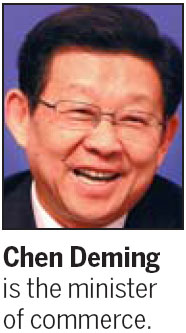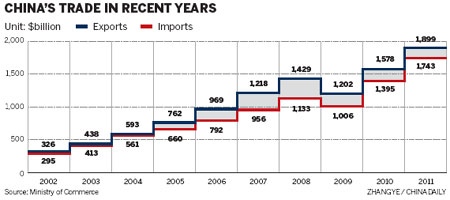 |
|
|
|
|||||||||||
|
A technician from the Shanghai entry-exit inspection and quarantine bureau inspects imported cars at the Waigaoqiao Port in Shanghai in January. [Photo / Xinhua] |
 |
"The US has constantly told us it plans to loosen its restrictions on high-tech exports to China in the past three years, but I didn't see any concrete progress, and, recently, I cannot hear even a whisper from them about it. I hope the discussion can continue," Chen Deming said in a speech at China Development Forum 2012 on Sunday.
The US restricts the sale to China of about 2,400 products for both military and civilian uses.
In 2009, US President Barack Obama asked Secretary of State Hillary Clinton and various agencies to re-examine the country's limits on high-tech equipment shipped to China.
"Using national security as an excuse, the US declined to export high-tech products to China, many made from the rare earth metals exported from China. Similarly, does China also have a security problem in exporting its rare earth metals? It's a question worth thinking about," Chen said.
Rare earth metals, a group of 17 elements used in high-tech products including mobile phones, hybrid car batteries, wind turbines and energy-efficient lighting.
On Tuesday, the US, the European Union and Japan jointly asked the World Trade Organization to help settle a dispute with China over Beijing's restrictions on exports of rare earths.

Meanwhile, Chen urged the US to be more open in attracting Chinese investment.
"We hope the US will open up so that Chinese businesses can invest there and thereby increase US export capacity," Chen said.
The productivity of the US is higher, especially in the high-tech sector and high-end service industry. If the US allows more Chinese companies to invest in the US, that will improve its capability in exports and narrow its trade deficit, Chen said.
China has made efforts to cut its reliance on exports, and its trade surplus as a percentage of GDP fell below 3 percent last year.
The decline in China's current account surplus to less than 3 percent of its GDP "is a significant response" to the argument about the Chinese currency, International Monetary Fund Managing Director Christine Lagarde said on Sunday.
The drop in China's current account surplus to 2.8 percent of GDP last year, compared with around 10 percent in 2007.
China's trade deficit was $31.5 billion last month while imports grew by 39.6 percent compared with February last year, more than twice the rate of export growth.
China, now the world's second-largest importer, is expected to become the largest importer and the largest internal market in the world in the coming few years, with an annual growth between 15 percent to 18 percent of its total volume of retail sales, much higher than the GDP growth, Chen said.